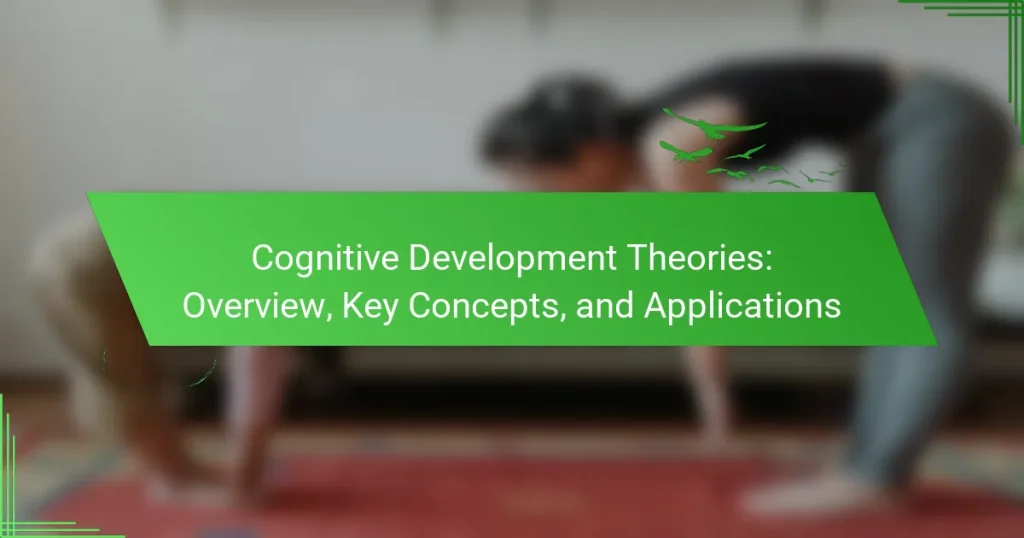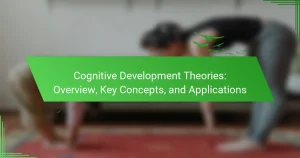Cognitive development theories provide essential insights into how children learn and grow. This article explores foundational principles, key concepts like Piaget’s stages and Vygotsky’s social interactions, and their applications in education. It also addresses misconceptions and offers best practices for enhancing learning experiences. Understanding these theories is crucial for effective teaching and fostering cognitive skills in diverse learning environments.
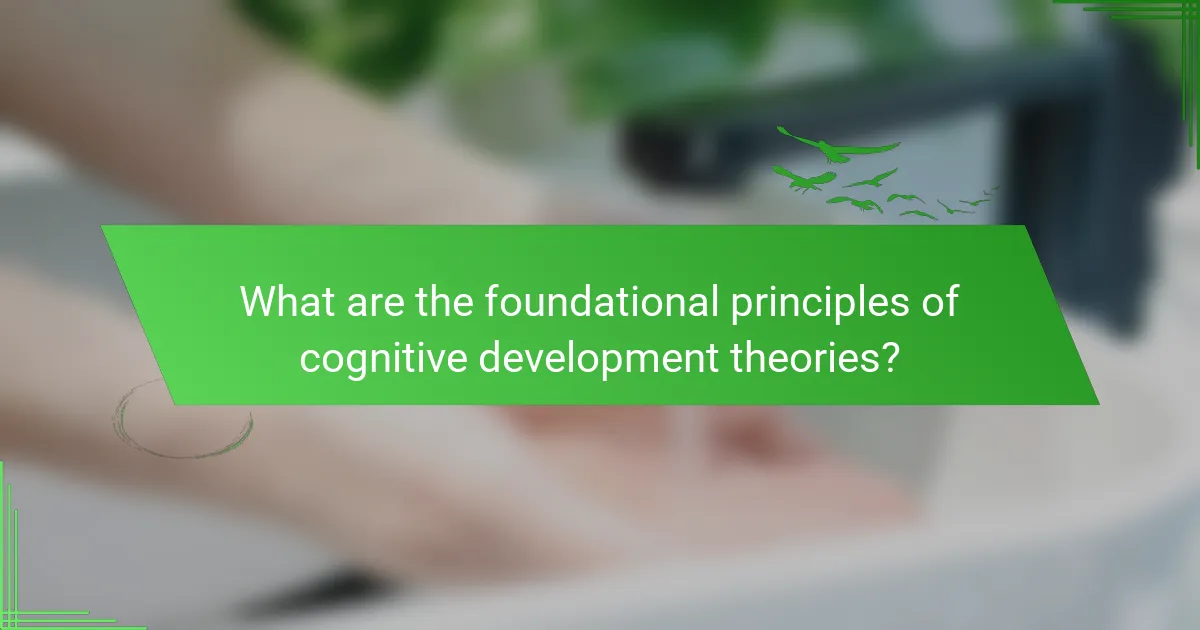
What are the foundational principles of cognitive development theories?
Cognitive development theories are grounded in several foundational principles. These principles emphasize the progressive nature of cognitive growth, the role of social interactions, and the influence of cultural contexts. Key concepts include the stages of development, as proposed by theorists like Piaget, who identified distinct phases children go through. Additionally, Vygotsky’s emphasis on the social aspects of learning highlights the importance of collaborative interactions in cognitive growth. Understanding these principles aids in applying cognitive development theories in educational settings and child development practices.
How do cognitive development theories differ across various frameworks?
Cognitive development theories vary significantly across frameworks, focusing on different aspects of learning and growth. Piaget’s theory emphasizes stages of cognitive development, while Vygotsky highlights social interactions’ role. Information processing theory analyzes how individuals process information, contrasting with the constructivist approach that prioritizes active learning. Each framework offers unique insights into cognitive processes, shaping educational practices and psychological understanding.
What is Piaget’s theory of cognitive development?
Piaget’s theory of cognitive development posits that children progress through four distinct stages of mental growth. These stages are sensorimotor, preoperational, concrete operational, and formal operational. Each stage represents a unique way of thinking and understanding the world, influenced by age and cognitive maturity. Piaget emphasized that children actively construct knowledge through interactions with their environment, highlighting the importance of experiences in cognitive development.
What insights does Vygotsky’s sociocultural theory provide?
Vygotsky’s sociocultural theory emphasizes the role of social interaction in cognitive development. It highlights how culture and language shape learning processes. Key insights include the importance of the Zone of Proximal Development, where learners can achieve more with guidance. This theory underscores the collaborative nature of learning, suggesting that cognitive skills are developed through social engagement and cultural tools.
How does the information processing theory explain cognitive growth?
The information processing theory explains cognitive growth as a systematic transformation of information through stages. It emphasizes how individuals encode, store, and retrieve data, enhancing their cognitive abilities. This theory outlines key processes such as attention, memory, and problem-solving, demonstrating that cognitive development is akin to computer processing. As children interact with their environment, they refine these processes, leading to increased understanding and adaptability. This perspective highlights the importance of experience and practice in cognitive growth, illustrating how mental capacities expand over time.
What are the key stages identified in cognitive development theories?
Cognitive development theories identify several key stages that illustrate how thinking evolves over time. The primary stages include sensorimotor, preoperational, concrete operational, and formal operational stages.
1. Sensorimotor Stage: Birth to 2 years; infants learn through sensory experiences and manipulating objects.
2. Preoperational Stage: Ages 2 to 7; children develop language skills and engage in symbolic play but struggle with logic.
3. Concrete Operational Stage: Ages 7 to 11; logical thinking develops, and children understand concrete concepts.
4. Formal Operational Stage: Ages 12 and up; abstract reasoning and problem-solving abilities emerge.
These stages reflect the unique attributes of cognitive growth, showcasing how children progress through increasingly complex ways of thinking.
What are the stages of Piaget’s cognitive development?
Piaget’s cognitive development includes four key stages. The stages are sensorimotor, preoperational, concrete operational, and formal operational. Each stage represents a unique way children understand the world.
1. Sensorimotor (0-2 years): Infants learn through sensory experiences and motor actions.
2. Preoperational (2-7 years): Children develop language and engage in symbolic play but struggle with logic.
3. Concrete Operational (7-11 years): Logical reasoning develops, and children understand concrete concepts.
4. Formal Operational (12+ years): Abstract thinking emerges, allowing for hypothetical and deductive reasoning.
How does Vygotsky’s concept of the Zone of Proximal Development function?
Vygotsky’s concept of the Zone of Proximal Development (ZPD) functions as a framework for understanding cognitive development through social interaction. It emphasizes the difference between what a learner can do independently and what they can achieve with guidance.
The ZPD highlights the importance of collaboration, where a more knowledgeable individual aids in the learning process. This interaction fosters cognitive growth by bridging gaps in understanding. As learners engage within their ZPD, they acquire new skills and knowledge that they can later apply independently.
In educational settings, ZPD informs teaching strategies, encouraging educators to tailor support based on each student’s developmental stage. This approach promotes effective learning experiences, ensuring that instruction is aligned with the learner’s current capabilities and potential growth.
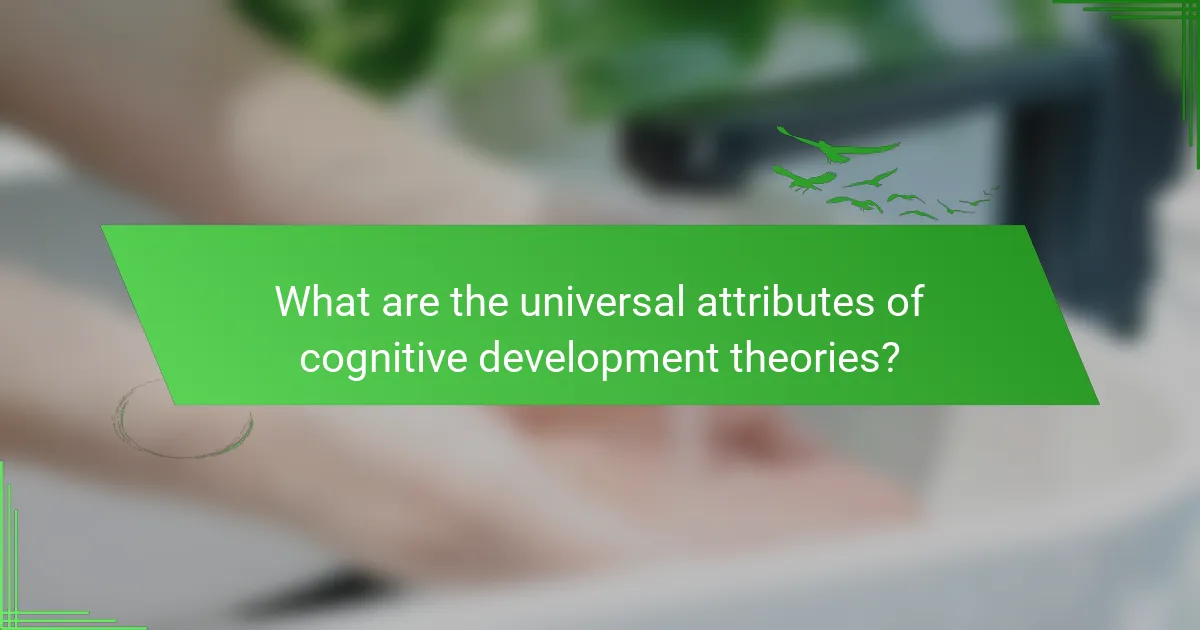
What are the universal attributes of cognitive development theories?
Cognitive development theories share universal attributes that encompass stages of development, cognitive processes, and environmental influences. These theories typically emphasize the progression of cognitive abilities through identifiable stages, such as those proposed by Piaget. They also recognize the role of social interaction and culture in shaping cognitive development, highlighting the unique attribute of context in learning. Additionally, they focus on the mechanisms of learning, including assimilation and accommodation, which are foundational to understanding cognitive growth.
How do these theories address the role of environmental factors?
Cognitive development theories emphasize the significant influence of environmental factors on learning and growth. These theories, like Piaget’s and Vygotsky’s, highlight how social interactions and cultural contexts shape cognitive processes.
Piaget’s theory illustrates that children construct knowledge through experiences with their surroundings, leading to different cognitive stages. Vygotsky’s framework underscores the role of social interaction, suggesting that learning occurs through guided participation within a cultural context.
Both theories recognize that environmental factors, such as family, education, and societal norms, are crucial for cognitive development. These influences can enhance or hinder a child’s ability to learn and adapt, demonstrating the interconnectedness of environment and cognitive growth.
What cognitive milestones are commonly recognized across theories?
Cognitive milestones recognized across theories include stages of development such as sensorimotor, preoperational, concrete operational, and formal operational phases. These milestones highlight key cognitive abilities like problem-solving, abstract thinking, and understanding of others’ perspectives. For instance, Piaget’s theory emphasizes the progression from concrete to abstract reasoning, while Vygotsky focuses on social interactions’ role in cognitive growth. Each theory offers unique insights into how cognitive skills develop over time.
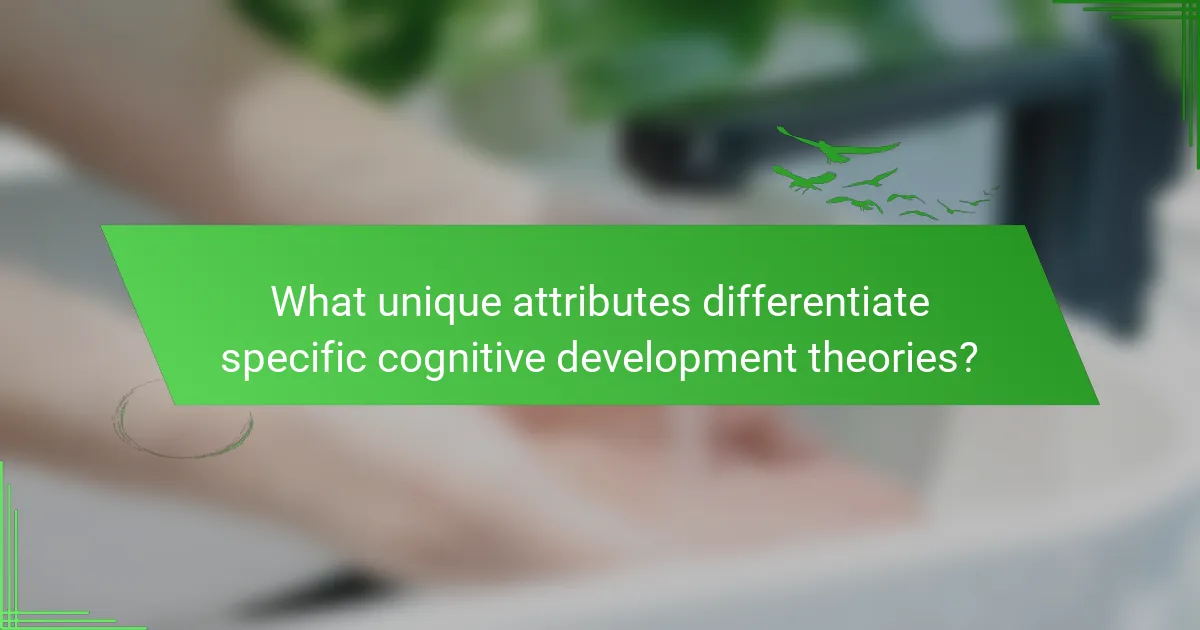
What unique attributes differentiate specific cognitive development theories?
Cognitive development theories are differentiated by unique attributes such as their focus, methodology, and developmental stages. Piaget’s theory emphasizes stages of cognitive growth, while Vygotsky’s approach highlights social interaction’s role in development. Erikson’s theory integrates psychosocial factors, showcasing a unique perspective on cognitive evolution. Each theory’s unique attributes contribute to diverse applications in education and psychology.
What makes Vygotsky’s approach distinct from Piaget’s?
Vygotsky’s approach emphasizes social interaction and cultural context, while Piaget focuses on individual cognitive development stages. Vygotsky introduces the concept of the Zone of Proximal Development, highlighting the role of guidance from more knowledgeable others. In contrast, Piaget’s theory centers on self-discovery through active exploration. This distinction illustrates Vygotsky’s unique attribute of incorporating social factors into cognitive development, making it more collaborative.
How do cultural contexts influence cognitive development according to different theories?
Cultural contexts significantly shape cognitive development through various theories. Vygotsky’s sociocultural theory emphasizes social interaction and cultural tools in learning. Piaget’s theory highlights stages of development influenced by environmental factors. Cultural context affects cognitive processes, such as problem-solving and reasoning, by providing distinct values and practices. For instance, collectivist cultures may prioritize group harmony, impacting individual cognitive strategies. Understanding these influences aids in developing educational approaches tailored to diverse cultural backgrounds.

What rare attributes exist within cognitive development theories?
Cognitive development theories contain rare attributes that offer unique insights. One rare attribute is the emphasis on cultural context, which highlights how different societies influence cognitive processes. Another rare attribute is the integration of emotional intelligence, showing how emotions impact cognitive growth. Additionally, some theories explore the role of technology in shaping cognitive development, a relatively new consideration in the field. These rare attributes enhance our understanding of cognitive development beyond traditional frameworks.
What lesser-known theories contribute to cognitive development understanding?
Lesser-known theories contributing to cognitive development include the Dynamic Systems Theory, which emphasizes the role of context and variability in learning processes. Another is Vygotsky’s Sociocultural Theory, highlighting social interaction’s impact on cognitive growth. The Theory of Multiple Intelligences by Gardner suggests diverse cognitive strengths exist beyond traditional IQ measures. Lastly, the Information Processing Theory compares the mind to a computer, focusing on how information is encoded, stored, and retrieved. Each theory offers unique insights into cognitive processes and development.
How do emerging trends in cognitive development challenge traditional theories?
Emerging trends in cognitive development challenge traditional theories by introducing new perspectives on learning processes. These trends emphasize the role of social interaction and technology in shaping cognitive growth. For instance, research highlights how collaborative learning environments enhance critical thinking and problem-solving skills, contrasting with earlier theories that focused primarily on individual cognitive processes. Additionally, advancements in neuroimaging reveal that brain development is more plastic than previously understood, suggesting that cognitive abilities can be significantly influenced by environmental factors. This shift encourages a more holistic view of cognitive development, integrating diverse influences rather than adhering strictly to established models.
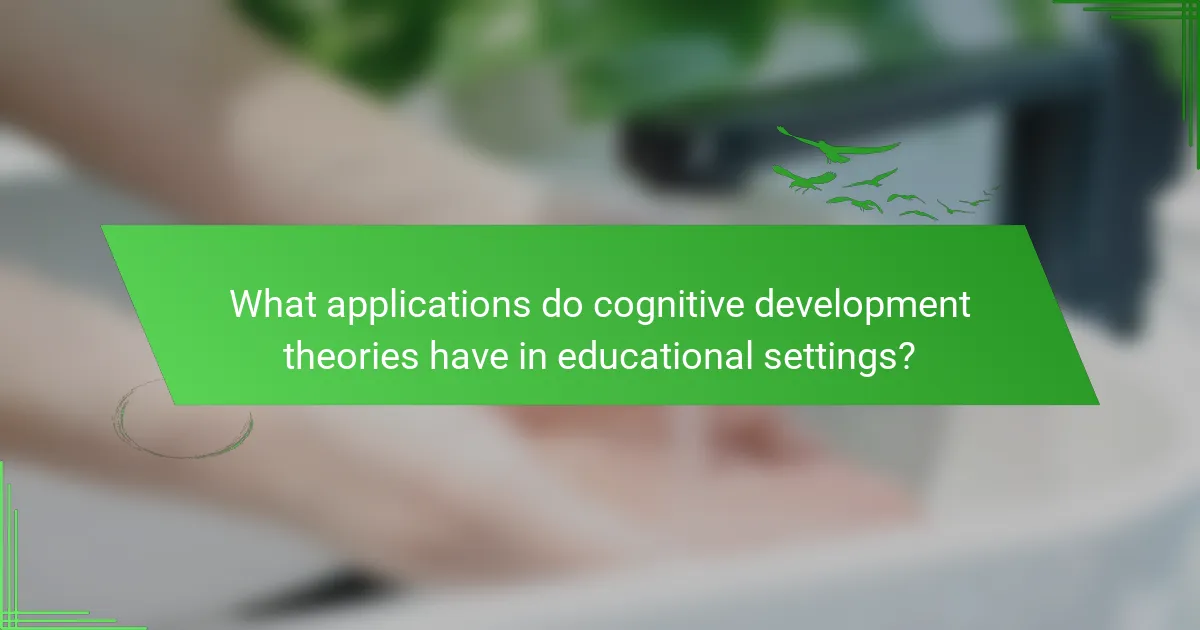
What applications do cognitive development theories have in educational settings?
Cognitive development theories have practical applications in educational settings by guiding teaching methods and curricula. These theories inform how educators foster critical thinking, problem-solving, and social skills among students.
For example, Piaget’s theory emphasizes hands-on learning, encouraging educators to create interactive environments that promote exploration. Vygotsky’s social development theory highlights the importance of collaborative learning, leading to group activities that enhance peer interaction.
Additionally, applying these theories helps in differentiating instruction based on cognitive readiness, ensuring that teaching strategies align with students’ developmental stages. As a result, cognitive development theories serve as a framework for creating effective educational practices that cater to diverse learning needs.
How can educators implement cognitive development theories in the classroom?
Educators can implement cognitive development theories by integrating active learning strategies, promoting collaborative activities, and utilizing formative assessments. These approaches enhance critical thinking and problem-solving skills. For example, using Piaget’s theory, educators can create hands-on experiences that align with students’ developmental stages. Additionally, Vygotsky’s emphasis on social interaction can be leveraged through group projects that foster peer learning. Regular feedback helps tailor instruction to meet individual needs, ensuring that all students progress effectively in their cognitive development.
What strategies enhance cognitive development in early childhood education?
Engaging activities and supportive environments enhance cognitive development in early childhood education. Strategies include interactive play, problem-solving tasks, and fostering social interactions. These methods encourage critical thinking and creativity, essential for cognitive growth. Research supports that hands-on learning experiences significantly boost children’s cognitive skills, such as memory and reasoning.
How can cognitive theories inform curriculum design?
Cognitive theories can significantly enhance curriculum design by tailoring educational experiences to how students learn. These theories emphasize the importance of understanding mental processes, which can lead to more effective teaching strategies.
For example, constructivist theory suggests that learners build knowledge through experiences. This informs curriculum design by promoting active learning opportunities, such as problem-solving tasks. Additionally, cognitive load theory indicates that information should be presented in manageable chunks, guiding the structuring of lessons to prevent overwhelming students.
Incorporating these theories results in a curriculum that not only aligns with cognitive development but also fosters critical thinking and adaptability in learners. Such an approach ensures that educational content is relevant and engaging, ultimately improving student outcomes.
What are the implications of cognitive development theories for special education?
Cognitive development theories significantly influence special education by emphasizing tailored learning approaches. These theories highlight the importance of understanding individual cognitive processes, enabling educators to create customized instructional strategies. For instance, Piaget’s theory advocates for developmental readiness, guiding educators to align curricula with students’ cognitive stages. Vygotsky’s social development theory underscores the value of social interaction, promoting collaborative learning environments that enhance cognitive skills. Overall, applying these theories fosters an inclusive educational framework, addressing diverse learning needs effectively.
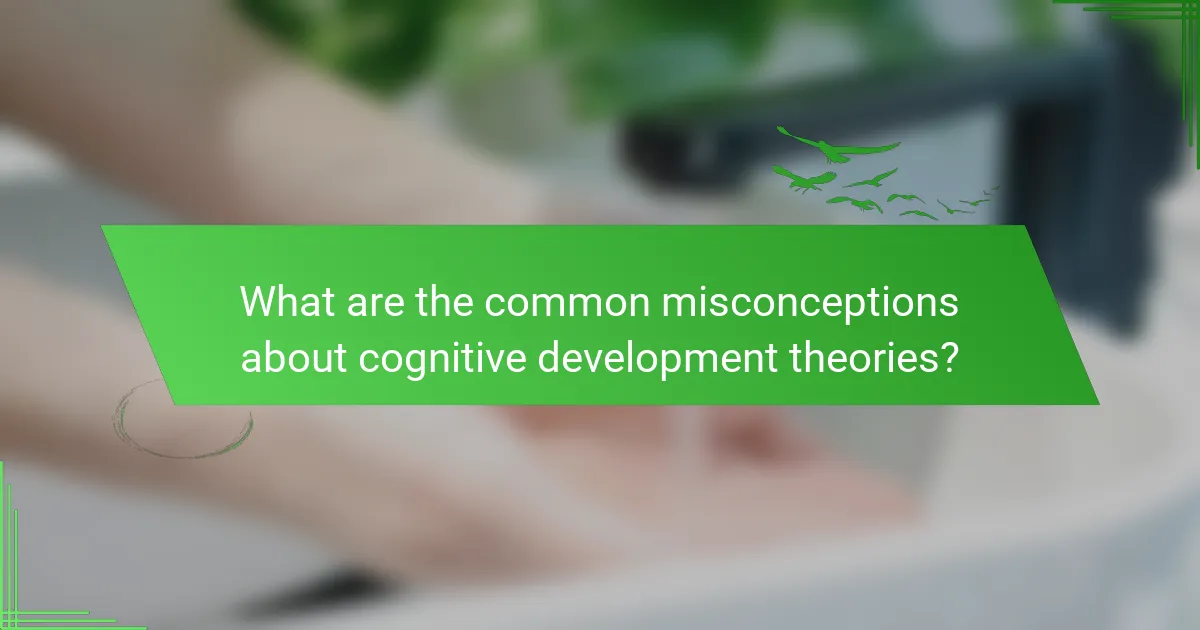
What are the common misconceptions about cognitive development theories?
Common misconceptions about cognitive development theories include the belief that development is a linear process, that intelligence is fixed, and that all children progress at the same rate. Many assume cognitive skills emerge purely through formal education, neglecting the role of social interactions and play. Additionally, some people think that these theories apply uniformly across cultures, disregarding cultural influences on cognitive growth. Understanding these misconceptions is crucial for applying cognitive development theories effectively in educational settings.
How can misconceptions be addressed in educational practice?
Misconceptions in educational practice can be effectively addressed through targeted strategies. Educators should prioritize identifying common misconceptions and employing evidence-based teaching methods to clarify misunderstandings. Techniques such as formative assessments can reveal student misconceptions, allowing for timely intervention. Additionally, fostering an environment that encourages questioning and discussion helps students articulate their thoughts and confront inaccuracies. Incorporating cognitive development theories, such as constructivism, can further enhance understanding by allowing students to build knowledge through active engagement. This approach aligns with the unique attribute of cognitive development theories, which emphasize the importance of prior knowledge in learning processes.
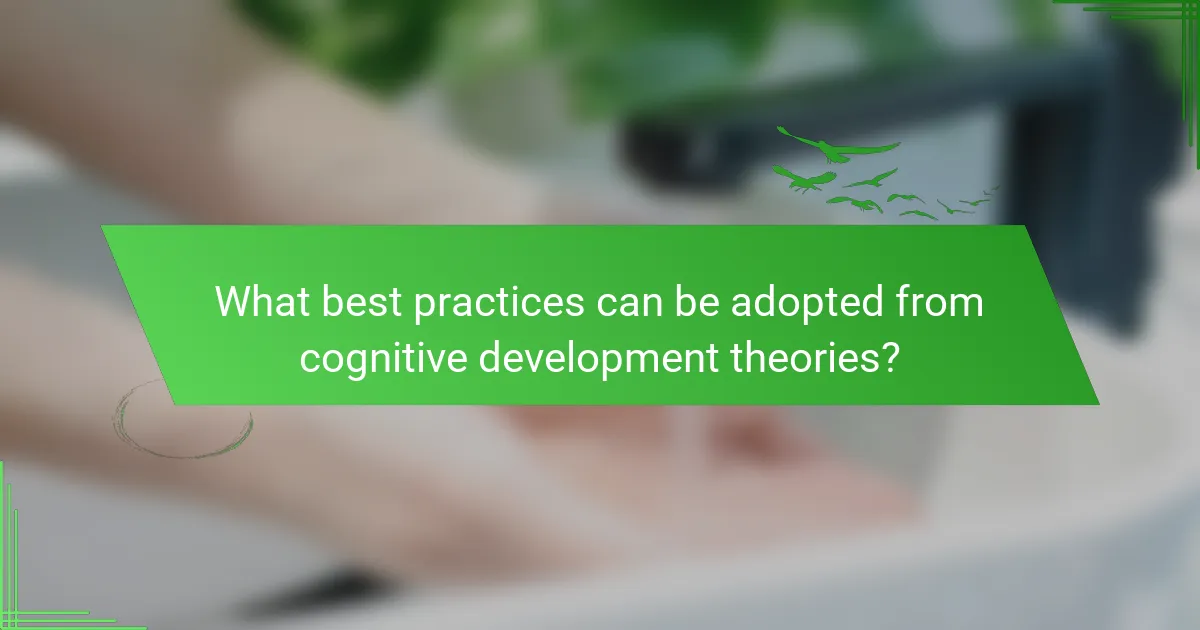
What best practices can be adopted from cognitive development theories?
Cognitive development theories provide valuable best practices for enhancing learning and growth. Emphasizing active learning, these theories advocate for hands-on experiences that engage learners.
Incorporating scaffolding techniques allows educators to support learners progressively, adjusting assistance as they gain competence. Promoting social interaction is essential, as collaborative learning fosters cognitive skills and emotional development.
Utilizing formative assessments helps track progress, guiding instructional adjustments to meet individual needs. Integrating diverse learning styles ensures that educational approaches resonate with all learners, enhancing overall engagement and retention.
Lastly, creating a stimulating environment encourages exploration and curiosity, crucial for cognitive advancement.
How can parents support cognitive development at home?
Parents can support cognitive development at home by providing a stimulating environment. Engaging activities such as reading, puzzles, and imaginative play enhance critical thinking and problem-solving skills. Consistent routines foster a sense of security, which is crucial for learning. Encouraging open-ended questions promotes curiosity and exploration, essential elements of cognitive growth.
What are the most effective methods for fostering cognitive skills in children?
Engaging children in interactive activities is one of the most effective methods for fostering cognitive skills. Techniques include play-based learning, problem-solving tasks, and creative arts, which enhance critical thinking and memory.
Incorporating structured routines supports cognitive development by providing predictability and security. Additionally, encouraging exploration and curiosity stimulates cognitive growth.
Social interactions are vital; group activities promote communication and collaboration skills. Reading together enhances vocabulary and comprehension, fostering language development.
Lastly, integrating technology mindfully can offer diverse learning experiences, but it should complement traditional methods to maintain balance in cognitive skill development.
